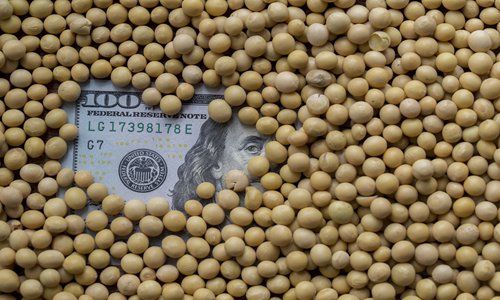HOME >> BUSINESS
US shouldn’t push China to specify agricultural import amount in trade deal
By Huo Jianguo Source:Global Times Published: 2019/11/28 21:53:40

The trade war triggered by US tariffs has invited retaliatory levies by China. Soybean is a commodity China imports in large quantities from the US. Photo: VCG
The US shouldn't push China to make commitments on specific amounts of agricultural product import increases in a first-phase agreement that would defuse the year-long trade war, or even take this as an "achievement" to show off, because such a "special treat" for the US is not in accordance with the World Trade Organization (WTO) rules and is not reasonable.If the US lets the trade talks get stuck at this point, but keeps putting pressure on China, or even interferes in China's internal affairs, it's putting the hard-earned progress of the trade talks and an interim agreement at stake.
According to the most-favored-nation treatment (MFN) under the principles of the WTO, if a country pledges to give preferential policies to any one country, the preferential policies should be applied to other countries as well, which means if China makes commitments on an import increase for US soybeans, other countries like Brazil and Argentina should also enjoy these policies.
Preferential policies solely for a specific country are deemed as being against the rules. This is why such requirements from the US will be unreasonable. It's pushing China to breach multilateral trade rules. The US shouldn't let the talks get stuck at this point, especially when China is making efforts to meet the demands the US has brought up.
China's good faith has been seen by the world during the trade talks. As for the demands brought by the US, China is stepping up measures to make improvements. The Chinese government issued guidelines for enhancing intellectual property rights (IPR) protection this month. China is also expediting the opening-up of its financial market. The yuan exchange rate has also been kept in a reasonable range.
To reach an interim agreement, the US is also showing positive signals and making concessions in removing trade restrictions and tariffs.
On the one hand, the Trump administration is faced with mounting domestic pressure to reach an agreement. On the other hand, the US' unreasonable move on the Hong Kong issue has crossed the line. It's not just interfering with China's internal affairs, but also putting the US in a very passive position in the trade talks.
The largest uncertainty over the phase one trade deal between China and the US is the US' pressure, which has extended the issue to other sectors and complicated the situation. China and the US have expressed the idea that they are approaching a major breakthrough in the trade talks, but the US is provoking new problems like the Hong Kong issue. The US' moves are expected to make both sides start a new round of feuding.
Even though both sides have expressed willingness to reach an agreement, and China has announced that positive achievements have been made, new contradictions will impact the world's expectations of the deal, especially the possibility and timing of the agreement.
The Trump administration keeps imposing new pressures and saying that it wants to reach a deal. Such teetering and irresolute attitudes will complicate the situation, and new problems are likely to emerge during the delay. What the US government needs to do is to show some restraint, let alone break international rules and interfere with other countries' internal affairs. It will only result in ruining the gains made by both sides and halting the good momentum in the trade talks.
At present, an interim agreement is not just significant for China and the US, but also significant for the global economy and markets. The international financial markets' performance has proved this point. Every time the tensions are rising between the two economies, pessimistic sentiment is immediately shown in the markets. The teetering attitude the US holds is hurting China and the US' common economic interests, catching companies in the middle.
The China-US trade war is not expected to be resolved in the short term, but an interim agreement to defuse the bruising trade war will provide a good start for the next round of trade talks and ease the tension. More complicated issues are expected to emerge in the future talks, but to solve problems though talks is the only right direction for both sides.
To solve the trade war problem step-by-step is a breakthrough reached by the US and China. Both sides should proactively promote the phase one progress. The longer the issue is prolonged, the harder it becomes to solve, because unpredictable unfavorable factors will make the solution seem unreachable.
The author is the vice chairman of the China Society for WTO Studies, and the former president of Chinese Academy of International Trade and Economic Cooperation in the Ministry of Commerce. bizopinion@globaltimes.com.cn
RELATED ARTICLES:
- Bareback competition held at 2019 Royal Agricultural Winter Fair
- Norwegian agricultural products find their way into the Chinese market
- BBC report smears agricultural cooperation between China, Russian Far East: Ministry
- China needs to diversify agricultural imports, provide investors with opportunity
Posted in: EXPERT ASSESSMENT